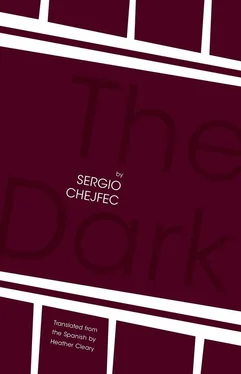These activities, designed primarily to make use of her physical strength — and, in the end, to sap it entirely — nonetheless granted her an immense vigor, in the form of an abundance or zeal that could overcome great adversity and moments of misfortune. Every so often I would think of the circle Delia represented: from the innocence I attributed to her at the beginning, to the strength of character one imagines the working class to have, then back to the simplicity of someone who considers her work to be essentially individual, so subjective it is invisible even to her. Delia was like that. This conviction could, in fact, have been grounded in profound wisdom, but it manifested itself in such a straightforward and constant way that it closed the circle perfectly, connecting the experiences and the sojourns of her spirit. The discovery that she worked in a factory, though it surprised me, was what made me fall in love with her. I can say, without exaggeration, that it was the mark that distinguished her from the rest of the human race, the condition that made her stand out from all other women. “Look at her… and a factory worker, at that…” I would think, assigning her a double density. As a thought it was empty, almost meaningless, but its shortcomings were compensated by the eloquence of the word and the circumstance: “worker.” A silvery ring seemed to surround her, announcing her condition and emphasizing it among other occupations and the titles these carry with them. And so each of her movements, even the mechanical one of stepping down with her right foot onto the corner of Los Huérfanos, took on another meaning. Although I didn’t know her — she and I had never actually exchanged words, nor had I ever had the chance to observe her carefully, up close — Delia already embodied the most desirable, the most complete ideal of a woman. In this fragmentary, accidental way, all my senses were focused on her, trying at first to get their bearings as they received the signs of her movements each afternoon. When they finally achieved this, evidently, it was forever.
During our walks, Delia would ask how I really felt about her. Accustomed to the world of the factory, where truth is measured, counted, and classified, she was confused by the thought of becoming the object of something at once definite and intangible, as emotions tend to be. Because everything that can be counted is untrue. To confuse her further still, and to show her the absurdity of her misgivings, I told her that my words might be untrue but our experiences together were real; or, the other way around, that truthful words were driving us toward false actions. What I meant was that truth and falsity were terms that had no place in our world. How was Delia’s way of thinking, which relied on accumulation and modification to measure change, distinct from that of a merchant, whose work is defined by the notion of difference? As a worker, Delia was in direct contact with the results of her labor: something was altered, a commodity was produced, or a piece was moved one step closer to completion. The merchant’s way of thinking was different, being based on a change in category rather than a change in condition. In any event, Delia didn’t own the things that passed through her hands, so her idea of measurability and concreteness was less calculated. As a worker, her position relative to these objects was at once subaltern and essential. The commodity determined her identity, it defined her as a worker; that same commodity also took her over, setting her apart by immeasurable distances as though she were from another world. Like geography, this movement is static, though this may seem contradictory: its meaning does not lie in change or circulation, in the idea of progress or a final objective, but rather in a movement that itself confers identity, like hours passing or, more appropriately, like those industrial pistons that do nothing but move back and forth. Delia’s hands, then, were the surface upon which production attained the status of a commodity. I’ve read many novels in which the protagonist can’t tell the difference between what is true and what is false — there is truth and falsehood in all things: people have true and false sides; someone chooses one part of a room as false and the other as true, and so on. I’ve even read an untrue book, or rather, a book falsified by circumstance, which described events that could have been real but eventually proved not to be. These events were both black and white; that is, they were neither. They were either outrageously false, or outrageously true. But with Delia, I was able to prove that these confusions meant nothing. Though she was sometimes at a loss for words, her expression was always appropriate, and no hint of ambiguity clouded her behavior. Coming from her, silence was something living, eloquent — it seemed crafted with the patience of stones, able to reveal the obvious without naming it.
One night, instead of walking around the Barrens, we crossed through them. Delia and I headed toward a house, a shack that bordered the street on the far side of the lot and in which reverberated the murmur of open spaces and unobstructed silence. We opened the door and the echo reached us before we set foot inside. It was the same as we walked in: the sound of each step bounced off the walls and returned to us before we had time to take the next one. Once more, without trying to, I was able to distinguish Delia’s scent, which came to me mixed with those of the vegetation that surrounded us beyond the makeshift walls. Just as we had heard our footsteps before taking them, Delia’s scent reached me as a premonition: I sensed it before my body was, as they say, joined to hers. In that moment, something was interrupted: time stood still, unable to contain what was happening. A jumble of scents, at times sharp and enigmatic, at times elusive, emanated from her. Later, I suppose, I’ll describe Delia’s scent, that invisible insignia, which in her case tended to fold in on itself and withdraw toward the greatest depths. Delia was timid, but never indecisive; her restraint was an indirect form of resoluteness, a deferral. The way she looked at me always unsettled me; her gaze was steady, true, and expressed itself only in terms of its depth, like wells do. What at first appeared to be caution was, in Delia, assurance, and what I interpreted as inhibition she experienced as desires that threatened and confused her in ways similar only in their urgency. What I mean is that Delia did not understand her desire — she was aware of it only as an assortment of vague ideas that she, nonetheless, was forced to obey as it pursued its own fulfillment.
I remember how we crossed the terrain. From the thicket of the night we stepped into another realm, thicker still: the Barrens, through which we haltingly felt our way, using our feet like hands. I walked ahead of Delia. The scents and vapors followed their individual paths, approaching one another, meeting and intermingling, showing that nature was still at its continuous, indolent work. Every so often a leaf would brush against our skin, leaving a slight irritation that burned when it came into contact with the air. Had we paused in that moment to examine our own actions, we wouldn’t have known how to explain them: though it may be hard to believe, we were driven by instinct, not will, and certainly not conscience. It was as though I were being propelled by the same force that pressed the scents around us upward, something that gave the impression of being natural and abstract, but which nevertheless was directed toward a decisive end; at the same time, I could feel Delia pulling me along, even though she was behind me. Once inside the shack, we felt the walls recede. It was not my mouth that kissed her, not her hands that clutched at me. I looked at her without eyes and touched her without fingers. And that wasn’t all: just as the memory of my hands on her breasts is the memory of my hands holding up the world, so too were the lips that kissed her not my own, but those of someone to whom I was joined, someone who surpassed me in every possible way, and under whose control I was given access to an abundance I would never have had otherwise. Delia’s breasts were delicate and, obviously, small. I remember the sense of intoxication that came over me as I held them, those times they pointed downward, feeling the seed of her nipple in the center of my palm; I had only to lift them to be reminded of how absurdly light they were, like petals. Before stepping inside, Delia had begun to tremble. “It’s the cold, the night air,” she lied. At first I was taken aback, but immediately told myself that if Delia lied, then so must the night, the dew, the stars, and the thistles. A unanimous lie turned into truth. I remember the afternoon I first approached her; before saying a word, Delia looked at me in a way that suggested her response, not in words, but through her disposition. It said something like, “I am completely attentive to whatever you might say, and am determined to respond sincerely.” Her eyes made this promise. She had barely stepped onto the corner of Los Huérfanos when I approached her and she met me in the way I just described, with her transparent gaze. I, who already knew her secret, thought to myself that only a worker could respond that way. The proof of Delia’s earnestness was precisely this: the fact that she was answering me before a question was ever asked.
Читать дальше












